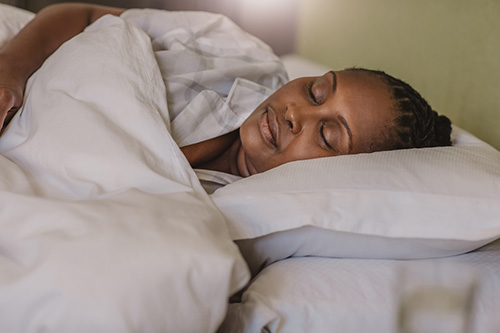Hormonal causes of irregular periods
Our periods are orchestrated by natural, interdependent hormonal shifts, so it’s no wonder that often the first sign of hormonal imbalance is a change in the rhythm, timing or heaviness of our periods.
“My periods started to be more regular and they were much more moderate. I know to the day when my period is going to come now! It used to be that the whole week was a wash. I had such heavy bleeding that I had to be near a bathroom at all times. Now I have freedom from worrying about it.”
Bea, customer

Irregular menstrual bleeding comes in many forms, and varies from woman to woman. You may experience spotting, mid-cycle bleeding or very heavy bleeding. The time between your periods may lengthen, shorten or become unpredictable. The way in which your cycle is “irregular” is unique to you, but the underlying cause is often the same, and rooted in hormonal imbalance. And the good news is it’s possible to naturally restore your hormonal balance and so the regularity of your menstrual cycle.
It’s common to have one or two irregular periods a year. But if you have more than that it’s a good idea to look at some possible causes and get your body back on track. Common causes of irregular bleeding are:
Perimenopause. If you’re over 35 you may be in perimenopause, the months or years of hormonal transition that lead up to menopause. Technically, menopause occurs when it has been 12 consecutive months since your last period, but it’s rare for women to menstruate regularly until their periods suddenly stop. More commonly, women notice changes to their cycles five, ten or even fifteen years prior to reaching menopause.
PCOS. Women with polycystic ovarian syndrome (PCOS) usually do not ovulate regularly. Since regular periods depend on regular ovulation (unless you are on birth control pills, in which case your “period” is actually a withdrawal bleed), one of the most common signs of PCOS is irregular bleeding. PCOS is commonly connected to insulin resistance, which is caused by diets heavy in sugar and refined carbohydrates.
Stress. Our adrenal glands are responsible for regulating cortisol levels, which have a direct impact on some of the hormones involved in menstruation such as estrogen and progesterone. The adrenals increase cortisol production in response to stress. Unfortunately, most women suffer from chronic stress that overburdens the adrenals and can lead to adrenal dysfunction. The resulting cortisol imbalance leads to fluctuations in estrogen and progesterone. Healing your adrenals is essential for regaining the hormonal balance necessary for regular periods.
Hypothyroidism. Thyroid function is intimately connected with all your body’s hormones. When your thyroid hormones are off balance such as with hypothyroidism, it can result in a wide range of symptoms, including irregular periods, fatigue, weight gain, and depression. Many women with irregular periods have subclinical hypothyroidism.
All of these problems are rooted in hormonal imbalance, and fortunately there is a lot you can do to regain hormonal balance naturally. The basic approach is to give your body the support it needs to make and balance its hormones, while reducing the demands on your endocrine system.
Women can regain their natural menstrual cycles with a few healthy dietary modifications, pharmaceutical-grade nutritional supplements, stress management and relaxation techniques. Your cycles will normalize if you give your body the right support. And we know what a relief that can be!










